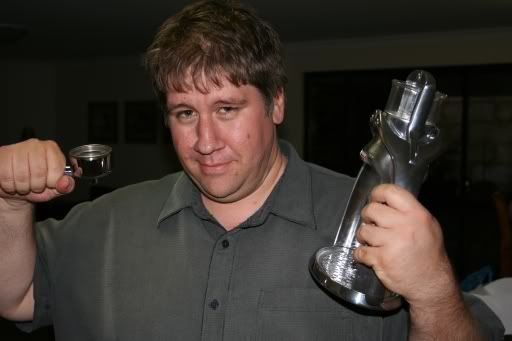So, if Atheists don’t believe in God, what do they believe in?
I’m willing to answer this question, as I have already commented on the understanding that the response refers to what I believe and isn’t an attempt to gather atheists within a broader church (too good to pass up, that one!).
So lets get the obvious out of the way. I don’t believe that the Bible is the literal word of God. What do I believe it is? It is a collections of spiritual philosophy, laws, social conventions, moral teaching and mystical writings. That description doesn’t do it justice – but I’m aiming for simplicity here. When taken as a whole, and as a book – rather than a divine revelation the bible is full of inconsistencies, I know, however that most Christians ‘interpret’ the bible in the context of the teachings of Christ, rather than following rigorously to the entire tome (otherwise there would be many more stonings of young ladies).
I don’t believe that humans descended from monkeys, but I do believe that humans and monkeys do share a common Hominid ancestor – the DNA evidence is compelling on that score.
I don’t believe that there was a great flood that covered all of the earth, I do believe that there was a terrible flood that destroyed a civilisation – the Black Sea maritime incursion or a similar incursion that formed the Persian Gulf are two candidates. These occurred within a timeframe that would support first an oral account and later a written account being recorded as Noah’s Flood. I don’t believe the biblical account because I live in Australia and I don’t remember hearing about Noah doing pick-ups and drop off’s this far south.
And yes, I’ve had a little fun with the first part of this post – it’s ‘the usual’ in terms of what an atheist is normally expected to provide as beliefs, but it is hardly deep is it?
No, I think what I need to be discussing are the spiritual beliefs that I hold – after all I’ve already stated that I believe humans to be spiritual creatures. I’ll try not to step outside my area of knowledge here – but human development does seem to suggest a rationale for spiritual beliefs. My own theory is around the need for humans to have hope, and the advantage that this provides to the survival of the species.
If you believe in an afterlife, a ‘reward’ for a good life, or services rendered, or for ‘fitting in’ you are more likely to be willing to die for a cause but at a more base level, you might also be prepared to attempt the apparently impossible, which could very well give you a survival edge. Imagination is part of this – humans are by far the most imaginative species on the planet and it has allowed us to make conceptual leaps that are astounding in many ways – there is after all a vast gap between imaging that one can fly and creating the means to fly.
So, I believe that humans have a spiritual aspect and that it serves a purpose.
I believe that this spiritual aspect needs expression and religious beliefs are one form of this expression.
Do I believe I have ‘certainty’? No, I still have questions, but I had the same question when I was a Christian and they weren’t answered to my satisfaction then either (stuff like “what came BEFORE the big bang?”, you know, the easy questions).
What I don’t doubt, is that the universe and the earth are very very old, so naturally when I get afflicted with bad science trying to prove the opposite I react to that and it does nothing to shift my position. I’ve heard a lot of the arguments before – in fact I’ve used them myself, including the old gem of “If I’m right and you are wrong then I go to heaven and you to hell, but if you are right and I am wrong then there is nothingness for both of us” as a rationale for believing. If this were the only reason to believe I’d still choose not to because I would consider it a very poor foundation for faith.
Coffee beans might convince me of the existence of a benevolent creator (with Nescafe being the evidence of the evil-one at work in the world) except that Guinea Worms and Filarial Worms point to a non-created life origin with nastiness, but not malign intent.
Sometimes I wish that I did believe in God. It would make things easier in some ways – someone to blame or thank, to scream at or to plead with, and then I could just ‘accept’ things that happen as the will of God. That would be just a bit too easy for me and it would not resolve my questions.
I am not certain that life is unique to earth or that the conditions necessary for life to commence were unique to earth. This does not weigh against a divine creator – who might have decided on more than one lab, but it does reduce the probability somewhat.
I believe that without religion, and without faith, humans may not have developed the capacity to progress to where we are today socially and technologically. But I also believe that they are part of the evolutionary process rather than part of a divine plan. Keep in mind that this evolutionary process itself may be considered flawed, given that it has delivered the consequence of a species with the capacity to destroy not only itself, but also all life on it’s planet.
I believe that for all our flaws as a species, we have achieved a capacity no create great beauty and to appreciate that beauty. We are likewise capable of appalling acts of violence and depravity on almost unimaginable scale, but also of resolute good in the face of implacable evil, of nobility in opposition to depravity, of compassion in meeting hatred, and of self-sacrifice, even for those who are not of our family or our state but related only by the common ties of humanity.
Humans are capable of such terrible horror, that we must absolutely also be capable of shining magnificence. In religion I found that our horror was our responsibility as the result of the sins of humanity, but the acts of greatness were the result of the glory of God.
To doubly condemn humanity seems to me an excessive cruelty and I would rather that we are capable of good and evil in equal measure, but that a greater number of us are seeking to act in ways that benefit others as well as themselves.
I reckon that will do for now, but I may add a bit later – The exciting news is that Hamo will be back tomorrow to banish the evil Grendel :pfree donkey punch download insider the free





